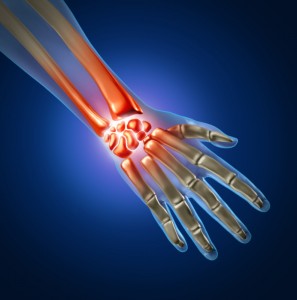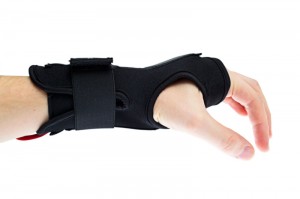 The carpal tunnel is a passageway from your forearm through your wrist (carpal tunnel) to your hand through which the median nerve passes. The median nerve provides sensation to the palm side of three of your fingers (not the pinky), and your thumb. The median nerve also provides nerve signals for motor function of the muscles around the base of your thumb.
The carpal tunnel is a passageway from your forearm through your wrist (carpal tunnel) to your hand through which the median nerve passes. The median nerve provides sensation to the palm side of three of your fingers (not the pinky), and your thumb. The median nerve also provides nerve signals for motor function of the muscles around the base of your thumb.
What is carpal tunnel syndrome?
Carpal tunnel syndrome is a condition in which compression of the median nerve impairs normal hand function and causes discomfort and pain. Other symptoms often associated with carpal tunnel syndrome are tingling and numbness of the fingers, hand and thumb (not the pinky), often extending through the wrist into the forearm, and weakness of the hand.
What conditions can cause carpal tunnel syndrome?
Anything that irritates, compresses, or otherwise injures the median nerve can cause carpal tunnel syndrome.
- Repetitive use of the hand and fingers (typing for example) can increase the chance of
 experiencing carpal tunnel syndrome.
experiencing carpal tunnel syndrome. - Rheumatoid arthritis can cause a narrowing of the carpal tunnel as can and injury such as a broken wrist.
- A simple sprain of the wrist can induce inflammation and swelling that can cause temporary symptoms of carpal tunnel but will usually subside when the swelling goes away.
How many people get this, how common is it?
Carpal tunnel syndrome is actually quite common, in fact it is estimated that between four and ten million Americans are suffering from carpal tunnel syndrome. Carpal tunnel syndrome is  the most often experienced nerve disorder in America.
the most often experienced nerve disorder in America.
Who is susceptible to carpal tunnel syndrome?
Persons that have jobs performing repetitive tasks with their hands are highly susceptible to carpal tunnel syndrome. Persons that have experienced wrist injuries, athletes, or persons that spend many hours daily on a keyboard are highly susceptible to carpal tunnel syndrome.
What treatments are available for treating carpal tunnel syndrome?
The bad news is that millions of Americans can suffer from carpal tunnel syndrome. The good news is that carpal tunnel syndrome can usually be treated successfully with anti-inflammatory medications and splinting to alleviate the symptoms of mild cases.
For more severe cases steroid injections in the wrist may be necessary and in the most severe cases surgery may be required to alleviate the symptoms. In very severe cases of  carpal tunnel syndrome the patient may lose some of their dexterity and motor skills in the affected hand.
carpal tunnel syndrome the patient may lose some of their dexterity and motor skills in the affected hand.






Leave A Comment